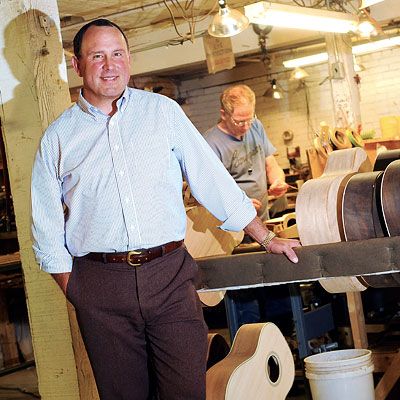Innovation engineer John Karp helps companies zero in on what works
 photo/Amber waterman
John Karp, an innovation engineer with Maine Manufacturing Extension Partnership, brings his expertise in product development to Bourgeois Guitars where he's CEO
photo/Amber waterman
John Karp, an innovation engineer with Maine Manufacturing Extension Partnership, brings his expertise in product development to Bourgeois Guitars where he's CEO
Here's an opening line that John Karp uses when meeting Maine manufacturers:
“Would you like a chance to get your new products to market up to eight times faster with 60% less risk?”
The question isn't rhetorical. Since earning a black belt in innovation engineering from the Innovation Engineering Management System, an offshoot of Doug Hall's Eureka Ranch innovation incubator, Karp has been spending his time helping Maine manufacturers compete in an increasingly global market.
Karp, who is the interim director of Maine Manufacturing Extension Partnership, is only the 22nd person in the country to earn the black belt designation, a testament to his ability to apply algorithms and quantitative analysis tools that can slice and dice their way through a company's inventory of ideas to find the proposals most likely to succeed. Used by powerhouse companies like Hewlett Packard, Nike and Ford Motor Co., innovation engineering is now available to smaller manufacturers. Karp has already worked with FHC, a neurosurgical products manufacturer in Bowdoin, and CONTECH Engineered Solutions of Saco, which makes products for transportation and infrastructure projects.
Mainebiz caught up with Karp between his MMEP duties and his other role as CEO of Bourgeois Guitars in Lewiston. The following is an edited transcript.
Mainebiz: How did you become an innovation engineer?
John Karp: I learned about the father of innovation, Doug Hall, when reading Inc. around 1990. It was an article on Eureka Ranch, how it was very creative and energy-driven, and I was fascinated; I learned what I could about him. I've been in product development for 25 years now and use many of Doug's ideas. Then, through MMEP, I had the opportunity to do innovation engineering as a consultant ... they sponsored [my participation in] the black belt program.
Was the training extensive?
I attended two multi-day sessions in Ohio preceded by hundreds of hours in homework. It was a total break-out course. The final alone was 20 hours. That'll tell you how deeply I drank the Kool-Aid.
How do you use it in your MMEP work?
The mission of MMEP is to make U.S. manufacturers more globally competitive and to pursue new products and markets so those companies will be successful. We use ISO, lean manufacturing and other procedures. But in the end, the best production system in the world is not worth that much if the end product is not worth much. Innovation is the key to long-term success. If a company doesn't have new products in the pipeline, but is instead relying on mature products on the other side of their life cycles, then the company's future profitability is in jeopardy. We engage a company, sift through ideas, vet ideas and kill off the ones that won't work. You can say 'yes, commercialize this,' or 'don't commercialize that.'
Have you seen it work?
Yes. For instance, with CONTECH, we helped them take a very difficult product — I'm sorry, I can't disclose what it is — to market faster than they would have otherwise. The key was getting them to think outside the box. The great part is this new product can be produced at minimal cost. n
Read more
How Sawyer Fredericks of NBC's 'The Voice' ended up with a Maine-made guitar










Comments